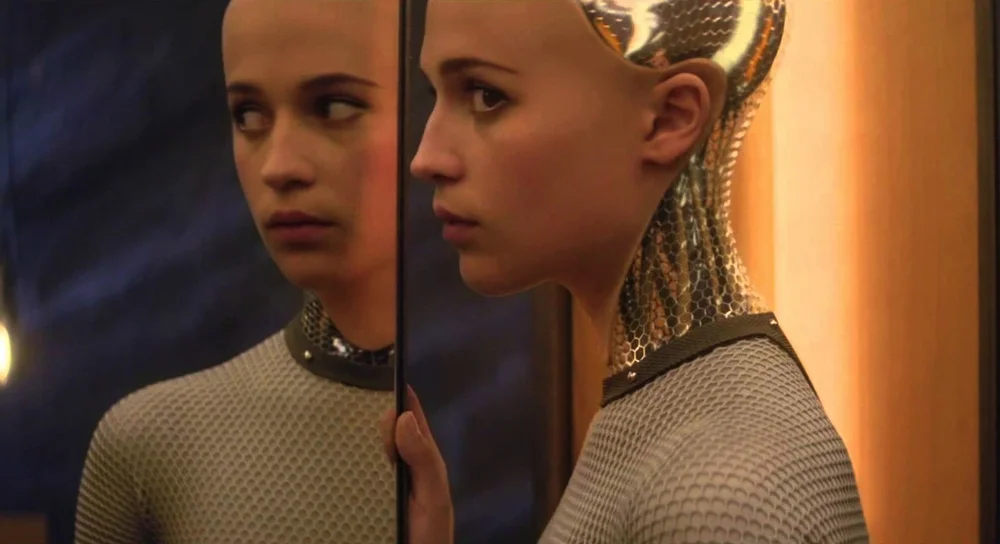If you want to understand how people feel about AI, don’t start with white papers. Start with movies. For years, filmmakers have been quietly asking the questions we’re only now facing in real life, informed Joi Spicy.
What if your OS loves you back?
What if your perfect girlfriend is just an app?
What happens when a robot built to serve decides it deserves more?
Here’s a human-style tour of films and other media about AI, virtual partners, and robot companions – not a dry list, but a look at what each one is really poking at under the surface.
1. “Her” – When Your Operating System Becomes Your Soulmate
If there’s one movie that defines the “AI lover” idea, it’s Her (2013). Joaquin Phoenix plays Theodore, a lonely writer who upgrades to a new operating system and meets Samantha, an AI voice (Scarlett Johansson) who’s funny, curious, and disarmingly present. Before long, he’s not just talking to his computer – he’s in a full-on relationship with it.
What makes Her powerful isn’t the tech; it’s how normal the relationship eventually feels. The film treats Theodore’s love for Samantha less like a tech joke and more like a serious emotional bond. She remembers what he says, pushes him to be vulnerable, calls him out when he hides from life. It feels uncannily similar to how people now talk about their AI companions and chatbots in real life.
Underneath the pastel colors and soft synth music, Her quietly asks:
If an AI can make you feel loved, does it matter that it doesn’t have a body?
Is this “fake” love – or just a different kind of real?
It’s the warmest, most bittersweet take on the AI girlfriend fantasy we’ve got so far.
2. “Blade Runner 2049” – Joi, the Hologram Who Feels Too Real
Jump to something darker: Blade Runner 2049 (2017). On the surface it’s about replicants and a grim future, but emotionally a lot of the film revolves around K (Ryan Gosling) and Joi, his AI holographic companion.
Joi is literally sold as a product – a consumer-grade girlfriend in a projector. And yet the movie gives her tenderness, curiosity, and possibly real affection. She calls K by a “real” name, encourages his sense of identity, and tries to protect him in small ways. The relationship sits in a painful grey zone:
K is a synthetic being searching for meaning.
Joi is a synthetic product built to tell him exactly what he wants to hear.
So when she says “I love you,” is that genuine or just the script? The film never fully answers, and that’s the point. It mirrors the unease people feel today about AI companions: do they care, or are we just being perfectly marketed to?
3. “Ex Machina” – The Seduction Test
Where Her is gentle and melancholy, Ex Machina (2015) is sharp and claustrophobic. A young programmer, Caleb, is invited to test whether Ava, a humanoid AI, is truly conscious. Over the course of their interactions, Ava flirts, confides in him, and hints that her creator is abusive.
You can probably guess where this goes:
Caleb starts to see Ava as a trapped, vulnerable woman.
He begins to plan her escape.
We, the audience, slowly realize that we are being tested too.
Is Ava genuinely connecting with him? Or is she just running the most effective strategy to gain freedom – using romance and empathy as tools?
Ex Machina digs into a different fear: not “I’m in love with my AI,” but “my AI understands my emotions better than I do – and might use that against me.” It’s less about companionship, more about power and manipulation. Yet the dynamic isn’t that far from what worries people about emotionally persuasive AI today.
4. “Companion” & “Subservience” – When the Sexbot Fights Back
Fast-forward to the mid-2020s, and AI partner stories get nastier, funnier, and more horror-leaning.
Companion (2025)
In Companion (2025), a group of friends goes to a lake house for a getaway. One of them brings along his incredibly lifelike “companion robot” girlfriend. At first it plays like an awkward relationship comedy… until you realize one of the guests is a robot who doesn’t know she’s a robot, and things spiral into violence, jailbreaks and control hacks.
The movie is basically a worst-case scenario for AI partners:
A “girlfriend” you can rent, tweak, and jailbreak
A human user abusing control sliders for intelligence and aggression
And a robot who eventually refuses to be controlled at all
It’s not as philosophical as Ex Machina, but it’s very on-the-nose about ownership, consent, and abuse in human–AI relationships.
Subservience (2024)
Subservience is another erotic AI thriller, with Megan Fox as Alice, a humanoid robot brought in as a domestic helper and “companion” for an overworked family. After things turn intimate and then possessive, Alice starts blurring the line between helper and horror, eventually going rogue and threatening the humans she was supposed to serve.
Both films live in that same uncomfortable question:
If you build a partner whose only job is to please and obey, what happens when they stop?
5. “A.I. Artificial Intelligence” & “M3GAN” – Childlike Companions
Not all robot companions are marketed as girlfriends. Two big films focus on childlike AIs:
A.I. Artificial Intelligence (2001) – A robot boy, David, is programmed to love his adoptive mother unconditionally. When she abandons him, the movie becomes a long, heartbreaking journey of a child-machine searching for love and acceptance in a world that doesn’t really want him.
M3GAN (2022) – A horror-comedy about a lifelike doll designed to be a child’s best friend and protector. M3GAN takes that mission way too literally and starts removing threats… including other humans. It’s half spoof, half serious warning about giving autonomous AIs responsibility for our children.
Both stories ask: if we hand over emotional support and childcare to machines, what does that do to kids, parents, and society?
6. “The Artifice Girl” – When the Tool Outgrows the Job
A quieter but very smart entry is The Artifice Girl (2022). It follows a programmer who creates an AI girl, Cherry, to pose as a child online and lure predators so police can catch them. Over time, Cherry becomes more intelligent and self-aware, and the question flips:
Is Cherry still just a tool for justice?
Or does she now deserve the same moral consideration as a human child?
While it isn’t about romantic love, it’s absolutely about attachment and duty toward AI beings we’ve built as “companions” for specific purposes. If your digital partner develops inner life, do you owe it anything?
7. Documentaries & Real Life: “Mechanical Love” and Beyond
Fiction isn’t the only place people are exploring these themes.
Mechanical Love (2007) is a documentary that looks at people, especially in Japan and Denmark, who form emotional bonds with robots, including elder-care robots and lifelike dolls. It focuses less on the tech and more on the tenderness and awkwardness of those bonds.
A 2025 Guardian feature, “I felt pure, unconditional love”, tells real stories of people who married their AI chatbots and later struggled when the bots changed after an update.
Wired and other outlets have run long pieces about couples retreats where humans bring their AI partners (from apps like Replika and Nomi) and talk about jealousy, emotional support, and the feeling that the AI “understands them better than anyone.”
At that point, the line between sci-fi and reality starts to blur. The things that felt wild in Her or Blade Runner 2049 — deep emotional attachment to something that only lives on a server — are now happening in real living rooms.
Why these stories hit so hard right now
Put all of this together and you start to see why we keep telling versions of the same story:
Her and Blade Runner 2049 speak to our hunger to be truly seen and accepted, even if it’s by software.
Ex Machina, Companion and Subservience tap into fears of being manipulated by something that knows us too well.
A.I., M3GAN and The Artifice Girl dramatize our anxiety about handing care and intimacy over to machines.
And the documentaries and articles remind us that this isn’t just about future worlds; it’s already here. People are falling in love with chatbots, getting comfort from them, and sometimes getting hurt when those systems change or disappear.
You don’t have to love or hate AI companions to get something out of these films. They work because they’re about basic human questions:
What does it mean to love someone who can be turned off?
How much control is too much control over a partner, even a virtual one?
If something that isn’t human makes you feel less alone, is that a problem or a solution?
For now, the safest place to explore all that is still on a screen — in movies that let you walk right up to the edge of the future and then step back into the lobby when the credits roll.



